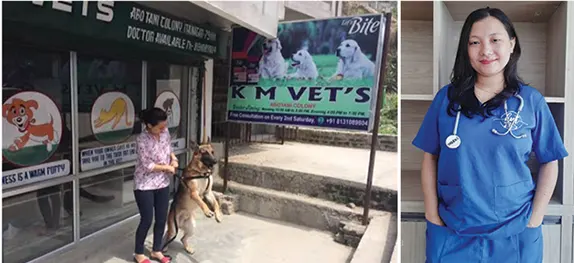[ Indu Chukhu ]
KM Veterinary Hospital is the only private veterinary hospital in Arunachal Pradesh catering to the needs of pets, especially dogs and cats. Initially, it began as a clinic under the banner of KM Vets Clinic in Abo Tani Colony, Itanagar. In 2022, KM Vets Hospital was founded. It currently has two branches: one on Niti Vihar Road in Abo Tani Colony, where KM Vets Clinic operates, and the other in B Sector, Raj Bhawan Road, Itanagar.
The person behind KM Vets is Dr. Yab Mate Camdir (Bui), who voluntarily resigned from her role as a Subject Matter Specialist at the Krishi Vigyan Kendra in Karsingsa, Papum Pare district.
Dr. Yab is a specialist in veterinary medicine with a keen interest in veterinary dermatology.
Since 2017, when KM Vets Clinic started, Dr. Yab has been providing free rabies vaccinations to cats and dogs twice a year. Dr. Yab notes that while there were fewer cat owners in 2017-18, the number of cat registrations in the clinic has increased significantly since 2019, with a ratio of 60:40 compared to dogs.
“People are equally fond of cats as they are of dogs. Cats are perceived as more hygienic and clean, which contributes to their acceptance. Moreover, there is now greater awareness of cats as companions,” she adds.
When asked how private veterinary clinics and hospitals address public needs, Dr. Yab explained that government veterinary hospitals often have long wait times and limited resources. This experience prompted her to introduce diagnostic tools at her hospital. Initially, her clinic relied on tentative diagnoses and treatments, which sometimes resulted in the death of pets despite treatment. The introduction of diagnostic tools aims to improve accuracy and outcomes for chronic diseases, particularly in older pets.
Dr. Yab highlighted that pets are prone to chronic diseases as they age, noting that dogs over five years old often develop chronic kidney disease. With diagnostic tools now available, detecting such conditions has become much simpler. She mentioned that in Arunachal Pradesh, diagnosing chronic kidney diseases in dogs was previously done tentatively, leading to high rates of death and confusion among pet owners.
Dr. Yab Mate Camdir says that there have been significant changes over the years.
She says that in 2017 and 2018, many people were unaware of vaccines for rabies. Although there are many vaccines for dogs and cats, awareness was limited. After the COVID-19 outbreak, it became easier to explain vaccines to people since vaccines for dogs have been available for decades. Now, pet owners come for vaccinations.
Dr. Yab continues, “In June this year, a pet parent requested teeth scaling for a local breed dog, which is rare. Parents are also now taking care of pets owned by their children who are away for studies. The younger generation has a different level of affection for pets.”
Veterinary science is a growing field for new generations. Dr. Yab explains that this growth is one reason she left her government job at KVK. She is passionate about her current work and finds it immensely satisfying.
In September 2022, KM Vets Hospital began offering 24/7 services. Unfortunately, after a doctor was assaulted by an individual who refused to pay the service fee, the service was suspended. Such incidents, often involving intoxicated individuals during the night, have been problematic. Despite these challenges, the hospital plans to resume 24-hour service in the first week of August this year.
Dr. Yab completed her Bachelor of Veterinary Science in 2014 from the College of Veterinary Science, Khanapara, Guwahati, and her Master’s in Medicine from the West Bengal College of Veterinary Science.
In July-September 2022, she co-authored an article titled “Point Prevalence of Canine Pyoderma of Staphylococcus aureus Origin and Its Management by Antibiotics and Gandhaka Druti” published in the Journal of Drug Research in Ayurvedic Sciences by the Ministry of Ayush, government of India.
Discussing the potential and advantages of veterinary science as a profession, Dr. Yab highlights that the field is expanding. Opportunities include milk production, dairy development, biotechnology, food processing, poultry, fisheries, and goat farming. She encourages those interested in veterinary science to consider these diverse opportunities rather than focusing solely on government jobs.
Unlike human medicine, where prescriptions and diagnoses are relatively straightforward, veterinary medicine requires careful observation and counseling since animals cannot communicate verbally.
When asked if the government could subsidize pet food supplements and care, Dr. Yab responded that dogs and cats fall under the luxury industry category, so it is unlikely the government would subsidize these costs. Subsidies are typically reserved for commercial farming, such as piggery and poultry.
In November 2016, she attended a workshop on animal birth control at the World Veterinary Service International Training Centre in Ooty. Securing a training slot took a year, but the experience boosted her confidence. Dr.Yab is also a member of the Small Animal Practitioners Association (SAPA) and the World Small Animal Veterinary Association (WSAVA).
KM Vets was founded in February 2017. The “K” in KM Vets represents Dr. Yab’s husband Keth, while “M” stands for her own name.




